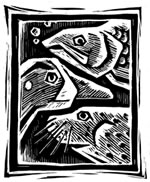- Home
- Restoration Projects
- Project Search
- SEA: Otolith Mass Marking of PWS Pink Salmon Using Tetracycline 94320-C
Project Information
Title: SEA: Otolith Mass Marking of PWS Pink Salmon Using Tetracycline 94320-C
Project Year and Number: 1994: 94320-C
Other Fiscal Years and Numbers for this Project: 1999: 99188-CLO, 1998: 98188, 1997: 97188, 1996: 96188, 1995: 95320-C
Principal Investigator (PI): Andrew Craig
Managing Agency: ADFG
Assisting Personnel: None
Research Location: Prince William Sound
Restoration Category: General Restoration
Injured Resources Addressed: Pink Salmon
Abstract: This project is a component of the Sound Ecosystem Assessment (SEA) program, a multi-disciplinary effort to acquire an ecosystem level understanding of the marine and freshwater processes that interact to constrain levels of fish, marine bird, and marine mammal production in Prince William Sound (PWS). Pink salmon are an important food source for fish, birds, and mammals, and provide a pathway for the transfer of nutrients accumulated from high seas marine areas to near shore and terrestrial ecosystems. Pink salmon are vital to the economy of PWS communities. Evidence indicating that the EVOS was partially responsible for weak pink salmon returning to PWS is growing. To ensure that adequate numbers of wild fish are returning to spawn, managers must be able to distinguish wild fish from hatchery fish. Coded-wire tags have been used extensively to estimate hatchery and wild stock contributions to harvests. This component of the SEA program is designed to test the feasibility of chemically marking fish otoliths or skeletal parts by short term immersion in a dilute solution of tetracycline during the embryo or emergent fry life stages, avoiding the cost and problems associated with coded-wire technology. Unlike coded-wire tags, marks from tetracycline are permanent, relatively easy to apply, easily recognizable, and do not appear to alter fish survival.Proposal: Not Available
Reports:
Annual Report FY94: View (1,114 KB)
Final Report: See Project 99188-CLO
Publications from this Project: None Available
